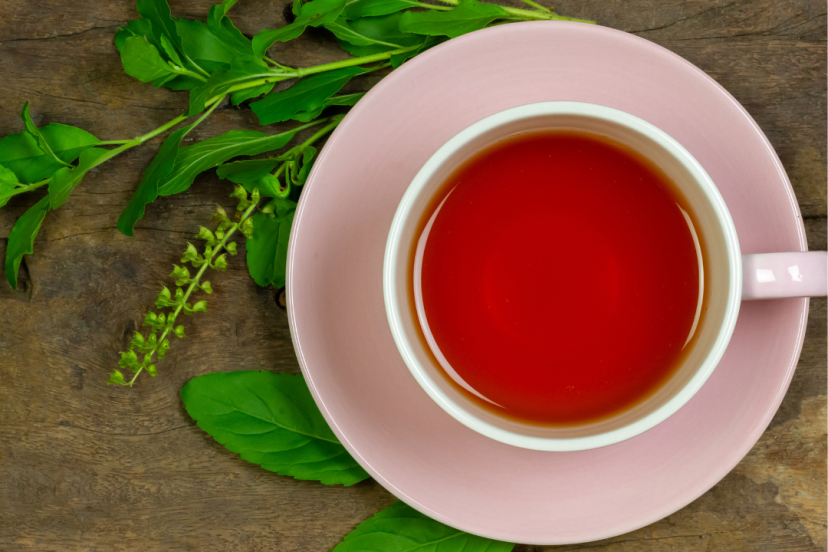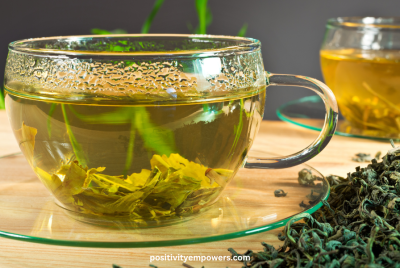Tulsi Tea – The Ultimate Guide to Benefits, Buying Tips, and More
Sharing is caring!
Tulsi tea is an herbal beverage known for its incredible wellness benefits, making it a popular choice among tea enthusiasts. Often referred to as “Holy Basil Tea,” it has a long-standing reputation in Ayurveda for promoting calm, enhancing immunity, and offering numerous other health advantages. In this guide, we’ll explore everything you need to know about tulsi tea—from its origins to its benefits and the best way to choose a quality product.
What is Tulsi Tea?
Tulsi tea, made from the leaves of the tulsi plant (Ocimum sanctum), has been cherished for centuries in traditional Indian medicine. Its unique, slightly peppery flavor with hints of clove and basil adds depth to your tea experience, creating a soothing ritual that’s both grounding and refreshing.
In Ayurveda, tulsi is celebrated as a potent adaptogen, a plant that helps the body adapt to stress. Its reverence is so high that this herbal tea is often considered sacred, and it is a staple in many households for its health-promoting properties.
Key Benefits
- Reduces Stress and Promotes Calm: Tulsi is known for its adaptogenic properties, which help balance stress hormones. Regular consumption of tulsi tea can support a calm mind and reduce the physical effects of stress.
- Boosts Immunity: Packed with antioxidants and essential oils, holy basil tea strengthens the immune system. It contains compounds like eugenol and carvacrol that have antiviral and antimicrobial properties.
- Anti-Inflammatory and Antioxidant Power: With natural anti-inflammatory agents, it can be particularly beneficial for individuals with joint pain, and it may support overall heart health by reducing oxidative stress.
- Digestive Health Support: It can soothe the digestive system, making it useful for issues like gas or bloating. It also aids in gut health, promoting a balanced digestive environment.
How Tulsi Tea is Made
Holy Basil Tea is crafted through a careful process:
- Cultivation: Tulsi plants are grown primarily in India, where the climate enhances their medicinal qualities.
- Harvesting: The leaves are hand-picked at the peak of freshness.
- Drying and Processing: After harvesting, leaves are gently dried to preserve essential oils and flavor. You’ll find tulsi tea as loose leaf, in tea bags, or in powdered form.
3 Types of Tulsi Tea Blends
- Krishna Tulsi: Known for its purple leaves and peppery flavor.
- Rama Tulsi: A green variety with a mellower taste.
- Vana Tulsi: Typically wild, with a more complex flavor profile.
Blends often mix these types for a balanced flavor and increased benefits, and some may even combine it with other herbs like ginger or ashwagandha.
What to Look for When Buying Tulsi Tea
When purchasing it, quality is essential. Look for:
- Organic Certification: Ensures it’s free from pesticides.
- Leaf Quality: Leaves should be vibrant and aromatic.
- Storage: Opt for well-sealed packaging to retain freshness.
Price Range
Tulsi tea is generally affordable, though prices vary based on quality:
- Loose Leaf: Usually ranges from $8 to $20 for a mid-sized bag.
- Tea Bags: Often available in boxes of 20–40 bags, priced between $5 to $15.
- Premium Blends: Organic or specialty blends might be slightly higher, especially if mixed with other adaptogens.
How to Prepare Tulsi Tea
- Boil Water: Use fresh, filtered water for the best flavor.
- Steep: Pour hot water over 1 teaspoon of loose leaf or a tea bag and let steep for 5–10 minutes.
- Enhance Flavor: Add honey, lemon, or ginger if desired.
A fantastic beverage for any time of day as it is caffeine free. However, drinking it in the morning can provide an energizing, caffeine-free start, while an evening cup helps calm the mind. It is generally safe, but consuming it in moderation is advised. People with blood clotting disorders should be cautious as it can thin the blood.
Why Choose Tulsi Tea for Wellness?
Compared to other herbal teas, it’s adaptogenic properties make it unique. For those looking to manage stress, support immunity, and enjoy a soothing beverage, tulsi tea is a top choice.
Final Thoughts
Tulsi tea, often celebrated as the “Queen of Herbs,” offers an impressive range of wellness benefits that go beyond your average cup of tea. Its adaptogenic qualities help the body resist stress, supporting a sense of calm and balance even in the busiest of days. Tulsi is also rich in antioxidants, which work to protect cells from damage and boost immune health, making it a great choice for seasonal wellness support. Whether you’re seeking improved mental clarity, better digestion, or simply a delicious way to unwind, holy basil tea is a versatile and nourishing addition to your daily routine.




